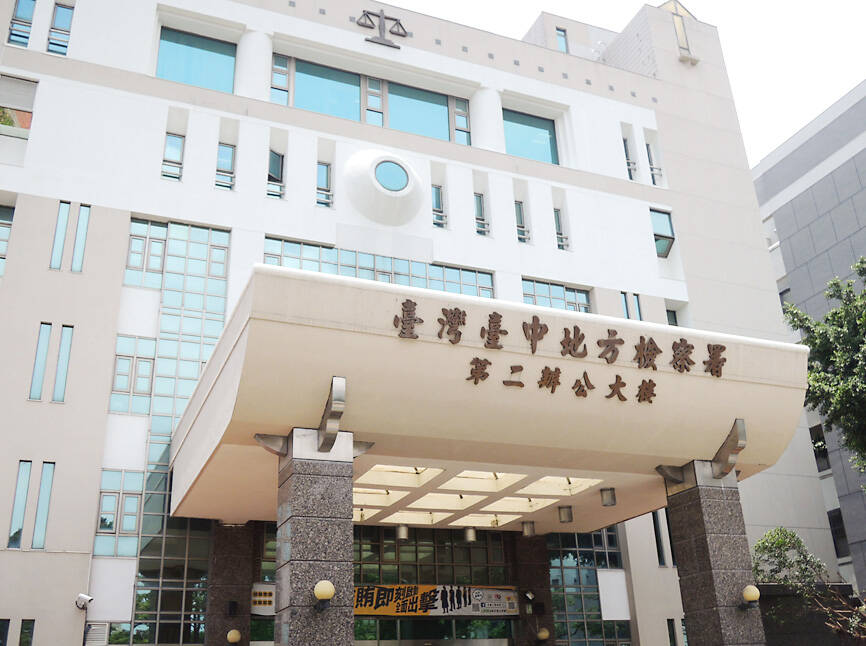The Taichung District Prosecutors’ Office on Tuesday said that it had opened a probe into allegations that Beijing is buying off borough wardens with trips to China ahead of next month’s presidential and legislative elections.
The investigation revolves around six people who might have contravened the Public Officials Election and Recall Act (公職人員選舉罷免法) and Anti-Infiltration Act (反滲透法), the office said, adding that police were tasked with the probe.
A group mainly composed of wardens and people active in local politics are under investigation, it said.

Photo: Chen Chien-chi, Taipei Times
China has been targeting wardens and other community-level officials in central Taiwan with tour deals in an attempt to interfere with the upcoming elections, sources said.
The group tours cost NT$13,000 to NT$15,000 per person, but Chinese officials shoulder a generous portion of that, sometimes paying almost in full, Taichung wardens said.
Multiple wardens in Taichung’s Tanzih (潭子) and Fongyuan (豐原) districts received suspicious calls from self-claimed Taiwanese entrepreneurs about group tours to China, they said.
Most wardens in the region were reluctant to break the law and too busy with campigning to attend such tours, they said.
Meanwhile, a score of teachers and principals from public schools in Keelung visited China’s Shandong Province on a five-day tour group that might also be funded by China, TV channel SETN reported on Tuesday, citing a leaked itinerary.
Members of the 10-day tour paid NT$9,000 per person — an unusually low price, it said.
Keelung City Councilor Jiho Chang (張之豪), of the Democratic Progressive Party (DPP), expressed concern over China’s infiltration of schools, adding that the cheapness of the trip raises red flags.
Separately, the Ciaotou District Prosecutors’ Office in Kaohsiung yesterday said it was investigating five people over accusations they had arranged free trips to China for dozens of voters in a bid to “influence” next month’s elections.
They allegedly arranged trips to China’s Hunan Province last month for 60 people from Kaohsiung and Taitung County and offered "benefits,” including free meals, accommodation and transportation, it said.
In return, they “asked for their support for candidates from certain political parties and with specific political leanings in an attempt to influence voters’ intentions and the election results,” the prosecutors said.
Additional reporting by Ou Su-mei,
Chang Hsuan-che, Lu Hsien-Hsiu, and AFP

Alain Robert, known as the "French Spider-Man," praised Alex Honnold as exceptionally well-prepared after the US climber completed a free solo ascent of Taipei 101 yesterday. Robert said Honnold's ascent of the 508m-tall skyscraper in just more than one-and-a-half hours without using safety ropes or equipment was a remarkable achievement. "This is my life," he said in an interview conducted in French, adding that he liked the feeling of being "on the edge of danger." The 63-year-old Frenchman climbed Taipei 101 using ropes in December 2004, taking about four hours to reach the top. On a one-to-10 scale of difficulty, Robert said Taipei 101

Nipah virus infection is to be officially listed as a category 5 notifiable infectious disease in Taiwan in March, while clinical treatment guidelines are being formulated, the Centers for Disease Control (CDC) said yesterday. With Nipah infections being reported in other countries and considering its relatively high fatality rate, the centers on Jan. 16 announced that it would be listed as a notifiable infectious disease to bolster the nation’s systematic early warning system and increase public awareness, the CDC said. Bangladesh reported four fatal cases last year in separate districts, with three linked to raw date palm sap consumption, CDC Epidemic Intelligence

Two Taiwanese prosecutors were questioned by Chinese security personnel at their hotel during a trip to China’s Henan Province this month, the Mainland Affairs Council (MAC) said yesterday. The officers had personal information on the prosecutors, including “when they were assigned to their posts, their work locations and job titles,” MAC Deputy Minister and spokesman Liang Wen-chieh (梁文傑) said. On top of asking about their agencies and positions, the officers also questioned the prosecutors about the Cross-Strait Joint Crime-Fighting and Judicial Mutual Assistance Agreement, a pact that serves as the framework for Taiwan-China cooperation on combating crime and providing judicial assistance, Liang

US climber Alex Honnold left Taiwan this morning a day after completing a free-solo ascent of Taipei 101, a feat that drew cheers from onlookers and gained widespread international attention. Honnold yesterday scaled the 101-story skyscraper without a rope or safety harness. The climb — the highest urban free-solo ascent ever attempted — took just more than 90 minutes and was streamed live on Netflix. It was covered by major international news outlets including CNN, the New York Times, the Guardian and the Wall Street Journal. As Honnold prepared to leave Taiwan today, he attracted a crowd when he and his wife, Sanni,